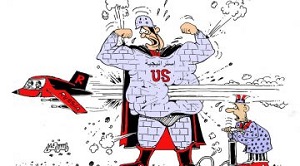The US president does not act or take his decisions in vain or by accident or mood. The truth is that President Trump stems from a political philosophy he believes in and seeks to devote it as an approach in America’s handling of the international system and based on two fundamental principles: management by chaos, management by surplus of capital strength and military power.
Perhaps what prompted President Trump to choose that approach and philosophy is the international situation that, over the past ten years, represented in the rise of military, economic and political forces that compete with the United States which believed that it became the world’s undisputed leader after the fall of the former Soviet Union and the collapse of the socialist system and what followed that of ideological prelude to the theorists of neo-conservatives and globalization as an economic and cultural context, whether Leo Strauss or Samuel Huntington to Francis Foucault Yama, who closed the history of the American model that must be pursued because it, as he claimed, is the ideal picture of human evolution and the roof of knowledge and freedom.
The United States launched two costly wars in Afghanistan and Iraq accompanied with a trend of unprecedented domination and authority on the international scene and its organizations whether the Security Council or other institutions.After that, forces rejecting the idea of hegemony emerged as a reaction to this trend calling for partnership in the leadership of the world based on the sharing of benefits and balance in international relations and respect for the sovereignty of States and the implementation of the Charter of the United Nations to be the decisive criterion. In parallel with those calls that found a good echo at the international level rose the star of the People’s Republic of China as an effective economic force and Russia as a military and economic force seeking to restore their roles in the international scene. Other regional and international forces with their economic, political and military weight, such as India, Brazil, South Africa and Iran have also emerged causing a political headache for the American, who thought he had grabbed the international game.
Those forces began to face the American in more than one arena, whether the Security Council or other organizations in addition to the hotbeds of military conflict in various forms and the American suffers defeats or prevent him from the achievement of successes he hoped. Perhaps the second term of the former President Barack Obama was the most expressive image of this situation that made the neo-conservative trend rooted in the American institutions describing him as the weak and hesitant one who lost Uncle Sam’s prestige.
In those climates, President Donald Trump, the businessman, came to the White House adopting a popular speech on the one hand and arrogant on the other. He gathered a wide audience both on the street level, and cartels in addition to his tickling of the feelings of the Jewish lobby,permeating in the joints of American life.Trump started his constitutional mandate with a speech about America,crying on the lost position and prestige of America due to the former weak President, Obama, and his administration, pledging to restore America’s dominant role in the world through the surplus of the financial and military powers, in violation of all international conventions and the international organizations and paying no attention to the American sovereign institutions, including the US Congress, the Pentagon, the CIA, and the media, which he considered hostile to him and his policies, so we saw him turning his back to them all adopting Twitter diplomacy and ignoring all the other traditional media.
We can conclude that we are facing an unprecedented situation in the White House and that we are facing a president who does not care about international institutions, their commitments and charters, nor America’s obligations as a state. The proof of this is what happened in the nuclear agreement with Iran and the recognition of Jerusalem as the capital of the Zionist entity and last but not least his recognition of the so-called Israeli sovereignty over the occupied Syrian Golan.
In all that has been mentioned, it contravenes international laws, the Charter of the United Nations and international legitimacy, which means that president Trump has his own agenda to establish two fundamental issues in international relations: the power of arms and the strength of money, rather than international law, international institutions and the principle of sovereignty, because he is convinced that America no longer controls the Security Council and its resolutions or other organizations emanating from the United Nations, so the US has to exercise its economic and military power to control the world or seize it by the threat of military or financial power and its fuel is the US dollar the old new weapon.
Trump, coming from the business and financial circles, sees in America an economic company and a security institution for protection for money and its strength and continued influence call for its declaration (Black water) and dealing with it according to that image and model and perhaps the Arab Gulf countries are the first that took it for granted, by giving bountifully billions of dollars to him in a visit to the gulf a year ago and what followed that of forms of financial blackmail and political bullying expressed in more than one position. Perhaps Trump’s policy of force will cause him the complex of Thiazides, which means the sense of surplus power, that consequently leads to destruction, as happened earlier between Athens and Sparta, and recently Germany and the allies, and later Iraq and Kuwait. The excess of power that was wrongly used in the three examples destroyed who employed it and devastated those countries. Does Trump learn the lesson?
Sharif Al -Khatib
Editor-in-Chief
sharifalkh@gmail.com

